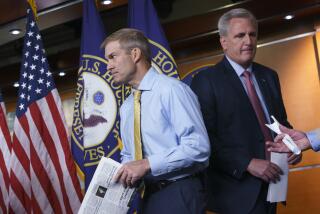Head of Joint Chiefs Reassures Uzbekistan Amid Aid Cutoff
- Share via
TASHKENT, Uzbekistan — The United States’ top military officer stopped here Thursday to reassure an important Central Asian ally worried about the Bush administration’s move to withhold military aid because of the slow rate of political reform.
The visit by Joint Chiefs of Staff Chairman Gen. Richard B. Myers, part of a weeklong, five-nation tour of allies in the administration’s campaign against terrorism, highlights the complex relationship between the United States and Uzbekistan. The U.S. counts on Uzbekistan for support in dealing with neighboring Afghanistan and the rest of the region, yet refuses to certify the former Soviet nation as qualified for about $18 million in military assistance.
“My perspective, from a military standpoint, is that Uzbekistan is enormously important for the United States. That’s why I’m here,” Myers said in an interview. “I was here not only to continue this maturation of this relationship but to reassure them that in fact we consider Uzbekistan an important partner.”
Last fall, two years after the United States launched much of its post-Sept. 11 invasion of Afghanistan from the Karshi Khanabad base just across the Uzbek border, the State Department decertified Uzbekistan. The move was made largely at the urging of human rights groups, which charged that the Uzbek government engaged in systematic torture.
State Department spokesman Richard Boucher said at the time that the Central Asian nation “has made some encouraging progress over the past year with respect to human rights.” The decertification, he added, was because of “lack of progress on democratic reforms” and restrictions on nongovernmental agencies operating in the nation.
That seemingly conflicting message has proved a source of frustration for Uzbeks and divided U.S. policymakers.
“We highly value relations with the USA,” Uzbek President Islam Karimov said in a meeting with Myers at the presidential palace in Tashkent, the capital.
Karimov’s authoritarian government is seeking to make the democratic, economic and political reforms to which it has agreed, but it is hampered by the pariah status that comes with the rebuke by Secretary of State Colin L. Powell, who again refused to certify Uzbekistan on July 13, an Uzbek diplomat said.
“We would like to pursue these reforms, but we cannot do it alone,” said Vladimir Norov, a deputy minister of foreign affairs.
The Uzbeks have allies in the Pentagon, where policymakers insist that withholding State Department money that funds military training and cooperation between the two nations threatens progress in the U.S.-declared fight against terrorism in Central Asia and drives Uzbekistan closer to another ally, Russia.
“My own view is that’s very shortsighted, and it’s never productive,” Myers said, referring to the withholding of funds, during a visit to a military training site in Tashkent. “In fact, it can often have the opposite effect that you don’t intend because you lose the ability to influence at all.”
He declined to directly criticize the State Department or congressional advocates of decertifying Uzbekistan. But he cited Indonesia, which was decertified in the 1990s, ending educational training in the U.S. for Indonesian officers and joint military exercises.
“When I was in the Pacific in ’97 we had a very close relationship in Indonesia with the military leadership there. Because of similar circumstances, we now have virtually no relationship with them,” Myers said. “And this cannot be good for stability either in that part of the world, in Indonesia or here.”
The general spent nearly two days in Tashkent after visiting the United Arab Emirates, Oman and Afghanistan.
More to Read
Get the L.A. Times Politics newsletter
Deeply reported insights into legislation, politics and policy from Sacramento, Washington and beyond. In your inbox twice per week.
You may occasionally receive promotional content from the Los Angeles Times.




